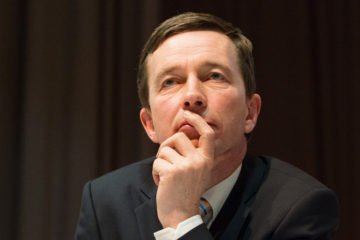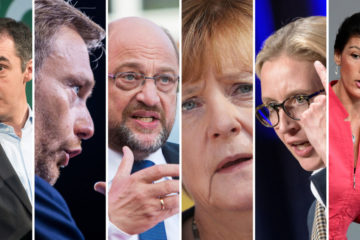In the wake of the 25th anniversary of the fall of the Berlin Wall, it might be useful for the future of the European Union foreign policy to take stock of the evolution of German power politics. Arguably, European politics have seen the rise of a German hegemon, not only in the field of internal affairs – as illustrated by the leadership position it acquired during the Euro crisis – but also, and more recently, in the contested field of foreign policy. Increasingly, Germany has become the European interlocutor in the EU’s external relations. Namely, in relation to the Eastern neighbourhood, during the Ukraine crisis.
Germany, the hegemonic colossus
Historically, the post-Cold War geopolitical environment shaped by gradual European integration under the US umbrella, enabled the advent of a German European leadership role. Indeed, under the unipolar system of the post-Cold War period, intra-European relations developed to such an extent that made German recovery possible, replacing great fear with deep-rooted trust. Nowadays, there is rarely any European policy issue debate that is tackled without taking into great account the German position.
Not only is Germany the largest member state in population terms, but it also lies at the very heart of the Union. Hitherto a handicap, Germany’s geographical position is now an immense advantage, commensurate with its large economic power. Moreover, the strong leadership of Chancellor Angela Merkel has undoubtedly enhanced the country’s zeitgeist. Given a relative decline amongst its European partners (namely, France), Germany’s contrasting hegemonic potential is evermore pronounced.
Thereby, a real shift in the external perceptions towards Germany’s hegemonic power – from a threat to trust and dependency – is clearly illustrated by Poland’s Foreign Minister Radek Sikorski’s claim that he fears “German power less than German inactivity.” (Nov, 2011).
From cacophony to polyphony: the role of German leadership (Expectations)
Thanks to the 2008 Euro crisis, a potential British exit and a European lethargy regarding foreign policy matters, the underlying lack of vision and growing polarization of the Union is seriously hampering the recognition of a European “actorness” capacity in the international arena.
Crucially, it is in Germany’s vital interest to preserve the EU so as to maintain its status quo, and its legitimacy within the new multi-polar world order. The potential unravelling of the EU would undoubtedly prompt the reopening of the “German Question” and, by the same token, seriously undermine Germany’s prosperity.
Given its pre-eminent role in facing the sclerotic EU foreign policy in dire need for reform, Germany should prompt a rethinking of the direction of European foreign policy. If neglected, such a conceptual vacuum would quickly be addressed by a burgeoning populist rhetoric, and would undermine the European project as a whole.
Hence, Germany needs to first reassert its three Kohlian pillars of leadership: a solid sense of direction; flexibility and willingness to cooperate; and strong diplomatic ties with the neighbourhood. However, given the intricacies of the contemporary European framework, a set of new leadership parameters also needs to be added to the equation. Germany needs to adopt a clear stance regarding its foreign policy interests, especially regarding the ambiguity surrounding its historical reluctance on the use of hard measures. Additionally, there is a call for a more sensitive diplomatic and economic approach towards its neighbours, in particular, Britain.
Germany, a reluctant hegemon (Capabilities)
Despite such grand expectations laid upon German leadership as Europe’s white knight, it is noteworthy to underline a certain reluctance on the part of Germany to effectively take the lead, which leads us to a capabilities-expectations gap pattern.
The quandary rests on several factors which hinder the prospect of Germany pursuing a more active role in European foreign policy matters. Firstly, an important disparity between Germany’s pretensions and its European partners’ expectations is evident when assessing Germany’s “checkbook diplomacy”. When talking about Germany’s responsibility towards the Union, European partners arguably assume a German active role, whereas Germany itself restricts this notion to the limits of its comfort zone, in line with its traditional passivity.
Secondly, German geopolitical interests remain ambiguous given its “culture of restraint” heritage. The country purposely eludes the commitment to a clear set of national interests, namely in regards to its military shyness.
Lastly, a clear capabilities-expectation disparity lies in the poor state of Germany’s armed forces, as was revealed by a recently leaked parliamentary report. Thereby, an embarrassed German hard power certainly undermines its capabilities to become the vanguard of European foreign policy leadership.
In a nutshell, albeit a strong German leadership being arguably crucial in mobilising a European coalition to rethink a foreign policy strategy, one cannot dismiss the reluctance of the German hegemon to take over this ‘shepherd’ role. Nor can one ignore the need to bridge an historical aversion to “hard” power with a capability discrepancy, in order for a real shift in the European foreign policy strategy to be conceptualized.



